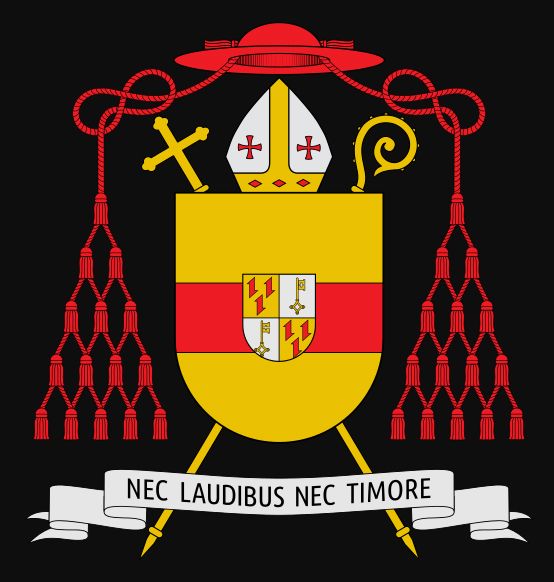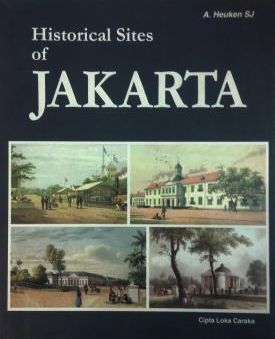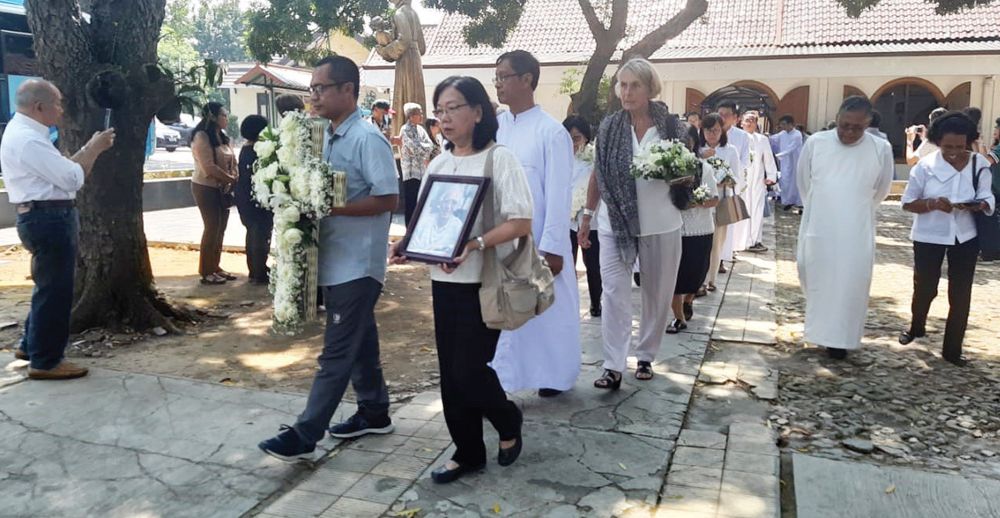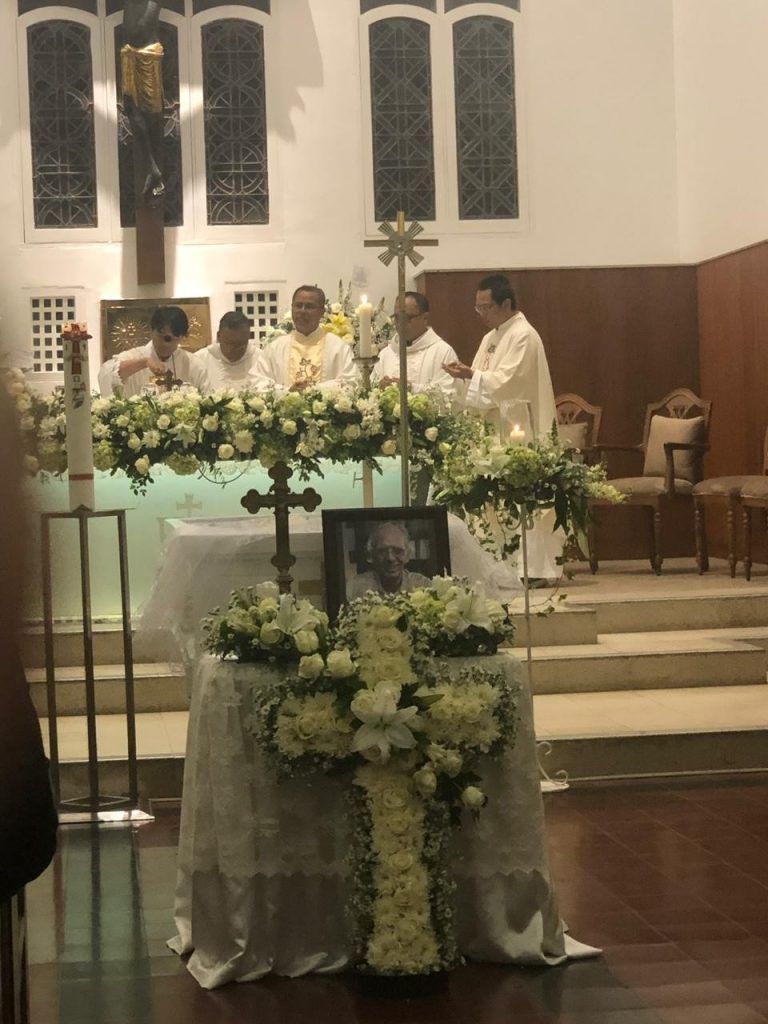IO – Pater Adolf Heuken helped to bury my mother up in the mountains near Puncak in 1994. Although she was not very religious herself, she came from a devoutly Catholic family in Germany’s Rhineland and Pater Heuken a fellow Catholic and German performed the last rites and prayers for her. It was a little tense at the time and that area of West Java is not known for its religious tolerance so that when it came time to sing a hymn there was a hesitation amongst the Catholic singers. Pater Heuken looked at me questioningly but when I nodded my head, he firmly continued and we sang for my mother as she went to her last resting place. She herself was a good singer and I wanted her to have a last song.

Pater Heuken was a man who had courage, both as a priest and as a human being. Perhaps, his childhood experiences inclined him in that direction. He was born in Coesfeld Germany about 30 kilometres east of the town of Munster on the 17th of July 1929 to a very devout Catholic family of eight children. His father was a primary school teacher who moved to Munster when Pater Heuken was about one or two years old. In 1932 he was sent to a small town called Telgte as a school official where he remained the rest of his life.
The Nazi era was not a good time for devout Catholics. Pater Heuken remembered how January 6th or the feast of the three kings ( the magi or wisemen) had always been a public holiday. He remembered also how the Nazis who had little fondness for Catholicism deliberately declared January 5th as the end of the school holidays so that school children had to return to school before the feast day and so did not have time to fully celebrate it the next day. “The Day of the Three Kings celebrates Die Erscheinung des Herren or when after God first put himself into the world and involved himself with mankind i.e. when Christ was born (Christmas), he first showed his face to the whole world. Pater Heuken once explained to me. “This celebration was formerly much older than Christmas and used to be one of the most important feasts of the Catholic Church and the Orthodox Church. On the Day of the Three Kings we see Him showing his face not only to the Jews but to the whole world for the three kings were not Jewish – and the Nazis tried to interfere with that very important belief and celebration.”

Telgte was a pilgrimage town with the big church of Saint Clemens and the chapel of the Gnaden Mutter (Mother of Grace) next to it. Pater Heuken used to speak about how as children they would play and run through the chapel and each time genuflect and say a quick prayer when passing by the Holy Mother’s statue.
“Every month during the War, Clemmens August Cardinal von Galen would walk 12 kilometres once a month from Munster to Telgte to say mass at our church and we boys would run as fast as we could to the chapel when we saw him coming so as to have the privilege of serving as his altar boys. He was a very tall man and the boys respected and admired him so much that they wanted to be ready in the sacristy when he arrived.”
Von Galen became famous when in 1941, he delivered three sermons denouncing the arrest of Jesuits, the confiscation of church property, attacks on the Church, and the killing of the mentally insane. The sermons were illegally circulated in print and Pater Heuken and his siblings helped his father spread them at night. “The nuns who looked after the insane told him how the Nazis killed them”, said Pater Heuken. “The Nazis wanted to arrest him but did not dare because they were afraid that the people and soldiers of Catholic Munsterland would rebel just as the Catholics of Oldenburg had when the Nazis removed the crucifixes from their schools in the 1930s. They were forced to return the crosses and Bishop von Gallen became cardinal because of it.”

This was the world in which Pater Heuken grew up and perhaps it was these early examples of courage and discipline in one’s faith that helped provide him with the idealism and the fortitude to dedicate his life to the church in a foreign land far from his family and home. A life that gave up most worldly pleasures and must at times have been deeply lonely.
Pater Heukan passed away last Thursday, the 25th of July 2019. At his Requiem Mass, Romo Heru Prakosa told the congregation that Pater Heuken chose to join the Jesuit rather than the Franciscan order as Franciscans had to be able to sing well and also he wanted to travel. He arrived in Jakarta in 1953 when there were still trams and trishaws and became an anak Menteng or child of Menteng. In Jakarta he wrote and ran the Catholic press Cipta Loka Caraka. He dedicated his life to Jakarta which he grew to love and he tried to express God’s love in the place he was placed for nearly 50 years. He expressed that love through his writings about the history of Jakarta for he said that by knowing it better we love it better.

Pater Heuken always spoke his mind freely and could be quite critical of the government as well as of the private sector. As the author of Historical Sites of Jakarta (the most popularly read book on the history of Jakarta) he was distressed that the government left so many of Jakarta’s historical sites unrestored and unprotected. He frowned at conglomerates who owned 17th and 19th century VOC warehouses in the Kota Tua or intramuros area of Jakarta, to rot and disintegrate. At the end of the day he cared passionately about Jakarta, its history, its people and their culture and he advised both the public as well as the private sector on the history of Jakarta and its many historical sites.
Tinia Budiarti the former head of the city of Jakarta’s Tourism and Cultural Services who attended Pater Heuken’s funeral in Girisonta the Jesuit final resting place near Semarang said, ““I first came to know Pater Heuken when I began to work at the History of Jakarta Museum in Kota Tua. Later I began meeting him at exhibitions. Then after I was appointed head of the History of Jakarta Museum we often met to talk. It began when I organized evening tours of the various areas of Kota Tua. He provided lectures for the visitors together with the likes of Mona Lohanda and David Kwa. Those were the first tours conducted around Kota Tua.”
Tinia Budiati also frequently visited Pater Heuken at his house. “He understood my commitment to the history of Jakarta and supported me by sharing his enormous historical knowledge. I used to consult with him on dealing with heritage issues. I could always bring him all my worries and complaints about the historic buildings and he used to tell me his worries about them. He always used to declare ‘Ibu Tinia!’ with a big smile that lit up his face whenever he saw me. It was so uplifting. He was really like a father to me.”

Pater Heuken received the Satyalencana Kebudayaan (Satyalencana Cultural) award from the government. He was the only historian who could read both Dutch and Portuguese original historical sources and wrote many books about the history of Jakarta. He was close to former Jakarta governor Fauzi Bowo and became for a time a member of the Tim Ahli Pertimbangan Bangunan Cagar Budaya or Review Team for Heritage Buildings under the Dinas Ciptakarya, Tataruang dan Pertanahan or the Office of Land, Human Settlements and Spatial Planning of the Jakarta Municipality.
Pater Heuken also received the Order of Merit of the Federal Republic of Germany. Ambassador Peter Schoof said, “Fr. Heuken … built bridges in many ways: Bridges between our peoples and countries, by promoting knowledge and understanding of Indonesia in Germany, and vice versa. He also helped build bridges between faiths and religions, just like his brethren from the Society of Jesus. Personally, I consider his contribution to peace, interreligious dialogue, as well as promoting tolerance for religious minorities as especially important. This legacy of his will only grow in importance, over time.”

“The funeral at Girisonta the Jesuit cemetery was very beautiful”, commented Tinia Budiati who attended Pater Heuken’s funeral at the Pusat Spiritualitas Girisonta or Girisonta Spiritual Centre on the slopes of Mount Ungaran outside the town of Semarang. It is a Jesuit centre to study spirituality and besides the cemetery for Jesuits it provides retreats, has a novitiate to train new Jesuits, a library with over 41,000 books, the St Stanislaus Church and a nunnery. “Romo Heuken’s coffin was brought by an old-fashioned carriage to his grave. In the 18th century a carriage like that would have been drawn by horses but at Pater Heuken’s burial the Jesuit novitiates dragged the carriage to his burial site. I was very moved.”

Ana Gomes who until the 2nd of July this year served three terms as member of the European Parliament was before that the first Portuguese Ambassador in Indonesia after the invasion of East Timor. It was not an easy position to hold as the relationship between Portugal and Indonesia was at the time very strained. After she arrived one of the people, she went to for advice was Pater Heuken. “I have the highest admiration for his historical knowledge and learning but he also advised me when I started out as ambassador to Indonesia. He told me what was happening in Indonesian society and how best to handle it – and of course, he wrote about the Portuguese in Indonesia (Portuguese Sources of Indonesia).”
Pater Heuken also wrote religious books including a book on the history of the Catholic Church in Indonesia and one about the Jesuits 150 years in Indonesia. In this he addresses the thorny issue of the Jesuit Pater Joop Beek (1917-1983) who as national leader of the Society of Our Lady transformed it from a pious and apolitical movement into a pastoral and political training place for Catholic students. He employed various tactics to eliminate Communist influence. Pater Heuken was critical of Beek’s mixing religion with politics but denied that Beek was either directly or indirectly involved in facilitating the Communist killings after the attempted Communist coup in 1965 as he was accused of in a Dutch documentary.

One person who brought great joy to Pater Heuken’s life was Reza Tuasikal a young Moluccan filmmaker and hotel owner from the Banda Islands who first met Pater Heuken as he made new photographs for the revision of Historical Sites of Jakarta in 2001. He made a short documentary of Pater Heuken’s life in 2013 but the biggest project that they were working on was a documentary film about the Historical Sites of Jakarta which was to be given to schools to show to school children. There are only three chapters left not yet reviewed and Reza hopes to finish it soon. In 2017 Reza did an amazing thing. He was able to make Pater Heuken’s dream come true by bringing him to one of the most historical places in Indonesia: the Banda Islands. He did so with the help of the pinisi boat Silolona despite Pater Heuken being unable to walk and having a bad heart. “Pater dreamt about returning and asked me still last year but that was not to be,” Reza said sadly.

When Jakarta Governor Anies Baswedan, attended the 90th anniversary of Canisius College in 2017, well-known pianist Ananda Sukarlan, a former student of the College, and other pupils, left the room in protest as the governor was about to make his speech claiming that “his values contradict the principles taught at this school”. Jesuit Franz Magnis-Suseno, defended the Governor saying, “The actions would be justified if the governor had said anything obscene or offensive, but to contest a priori in an event that was not at all of a political nature, demonstrates public hostility and prejudice that… can be counterproductive, fomenting conflict and intolerance in a vulnerable country”.

Despite the hostile reception at Canisiuses 90th anniversary Governor Anies Baswedan came to the viewing of Pater Heuken’s body at the Canisius Chapel on the 26th of July 2019. Present at the same time was the well-known Sikh Indonesian agricultural expert and defender of the poor, H.S. Dillon who suggested to the Governor that he propose Pater Heuken for a government award in recognition of all his work with regard to the history of Jakarta. Governor Anies then asked the Jesuit Order to send him all Pater Heuken’s writings to propose to the President that he be given national recognition. So, a Sikh asked a Muslim to propose a Catholic for government recognition. Pater Heuken would no doubt have been amused and touched. Ah my dear Indonesia, sometimes one cannot help loving you… (Tamalia Alisjahbana)

